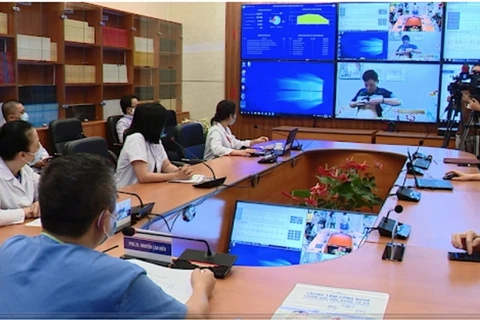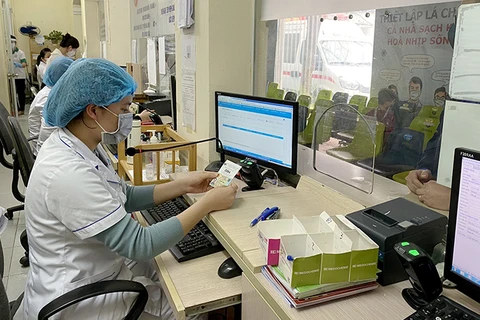Hanoi (VNA) – The Ministry of Health and the World Bank in Vietnam held a workshop in Hanoi on March 27 to discuss the orientations for developing grassroots healthcare in the new context.
Deputy Minister of Health Do Xuan Tuyen said the Party, National Assembly, and Government have issued many policies to improve grassroots healthcare, including Directive 06-CT/TW on consolidating grassroots healthcare, issued by the 9th Party Central Committee’s Secretariat on January 22, 2002.
The Secretariat has assigned the ministry’s Party Civil Affairs Committee to draft a directive on developing grassroots healthcare in the new context. The draft should be submitted to the Secretariat in May, he noted.
After 20 years of implementing Directive 06-CT/TW, Party committees and administrations from the central to grassroots levels have showed considerable improvements in the awareness of the importance of grassroots healthcare. Communities consider the consolidation of grassroots healthcare as a crucial task in socio-economic development plans.
 A medical worker gives check-up to a patient at the Hospital of Traditional Medicine in Lai Chau province. (Photo: VNA) As a result, basic health indexes of Vietnamese people have improved remarkably after 20 years. For example, the average life expectancy increased from 71.3 in 2002 to 73.6 in 2022, higher than the global average of 73 and many countries with the similar per capita income level. The coverage of essential health services reached 70 out of 100 points in 2020, higher than the average of 61 in Southeast Asia and 67 in the world. Vietnam has also gained respect from the international community for its realisation of the Millennium Development Goals.
A medical worker gives check-up to a patient at the Hospital of Traditional Medicine in Lai Chau province. (Photo: VNA) As a result, basic health indexes of Vietnamese people have improved remarkably after 20 years. For example, the average life expectancy increased from 71.3 in 2002 to 73.6 in 2022, higher than the global average of 73 and many countries with the similar per capita income level. The coverage of essential health services reached 70 out of 100 points in 2020, higher than the average of 61 in Southeast Asia and 67 in the world. Vietnam has also gained respect from the international community for its realisation of the Millennium Development Goals.
Those achievements were largely contributed by the grassroots healthcare network, participants opined.
However, there remains certain shortcomings, they pointed out, elaborating that grassroots health services are focused on treatment while lacking due attention to disease prevention, management, and early detection. The system is also facing numerous challenges such as rapid population aging, an increase in non-communicable diseases, and unpredictable developments of new epidemics.
They agreed on measures mentioned in the draft directive, including enhancing Party committees and administrations’ sense of responsibility, upgrading infrastructure, reforming communal-level medical facilities and financial mechanism, increasing manpower for grassroots healthcare, and stepping up health education./.
Deputy Minister of Health Do Xuan Tuyen said the Party, National Assembly, and Government have issued many policies to improve grassroots healthcare, including Directive 06-CT/TW on consolidating grassroots healthcare, issued by the 9th Party Central Committee’s Secretariat on January 22, 2002.
The Secretariat has assigned the ministry’s Party Civil Affairs Committee to draft a directive on developing grassroots healthcare in the new context. The draft should be submitted to the Secretariat in May, he noted.
After 20 years of implementing Directive 06-CT/TW, Party committees and administrations from the central to grassroots levels have showed considerable improvements in the awareness of the importance of grassroots healthcare. Communities consider the consolidation of grassroots healthcare as a crucial task in socio-economic development plans.
 A medical worker gives check-up to a patient at the Hospital of Traditional Medicine in Lai Chau province. (Photo: VNA)
A medical worker gives check-up to a patient at the Hospital of Traditional Medicine in Lai Chau province. (Photo: VNA) Those achievements were largely contributed by the grassroots healthcare network, participants opined.
However, there remains certain shortcomings, they pointed out, elaborating that grassroots health services are focused on treatment while lacking due attention to disease prevention, management, and early detection. The system is also facing numerous challenges such as rapid population aging, an increase in non-communicable diseases, and unpredictable developments of new epidemics.
They agreed on measures mentioned in the draft directive, including enhancing Party committees and administrations’ sense of responsibility, upgrading infrastructure, reforming communal-level medical facilities and financial mechanism, increasing manpower for grassroots healthcare, and stepping up health education./.
VNA

























